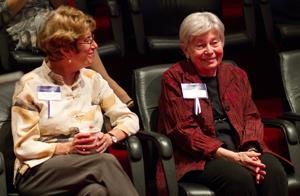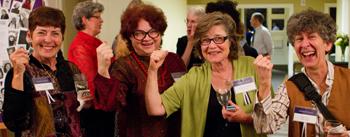Gender Matters
In 1962, Amherst hired Rose Olver, now the L. Stanton Williams '41 Professor of Psychology and Women's and Gender Studies, as its first female tenure-track professor. On Oct. 1 of this year, nearing the 50th anniversary of Olver’s arrival and facing the impending retirement and replacement of a large proportion of the faculty, the college held a symposium titled “Half a Century of Women Teaching at Amherst: Gender Matters.” More than 150 people packed the Cole Assembly Room, including current professors, students, alumnae and 60 percent of the women who taught at Amherst between 1962 and 1983.
 Ellen Ryerson (left), who taught in the Department of American Studies from 1968 to 1975, with Olver
|
You can watch video of the symposium here.
The following are just a few remarks from the addresses and panel discussions:
“[E]ven when we began planning this event, we had no idea that we were at yet another milestone: that Amherst was about to have its first female president—unthinkable in 1962…”
Professor of Psychology Elizabeth Aries, introducing the symposium
“I remember sitting here [at a faculty meeting] and thinking, ‘I need a tie,’ and feeling like I maybe better not sit with more than one other woman.”
Elaine Brighty, who arrived at Amherst in 1979 as the first tenure-track woman in the biology department
“The ‘one plus one equals more than two’ effect is really important.”
Laura Wexler, assistant professor of American studies and English from 1977 to 1985, on how helpful it was when a female faculty member could find support and camaraderie from at least one other woman on a committee or in a meeting
 C. Rhonda Cobham-Sander (left), the William R. Kenan, Jr., Professor of Black Studies and English, with Associate Professor of Biology Caroline Goutte
|
“I was one of the token women elected to the Committee of Six [the executive committee of the faculty] twice when I was untenured. … A rumor was circulating around campus that radical feminist lesbians were in cahoots to elect Gewertz.”
Deborah Gewertz, now the G. Henry Whitcomb 1874 Professor of Anthropology, who has taught at Amherst since 1977
“I dreamt [last night] that we were all sitting here, giving our little speeches in Chinese. And it only occurred to us about halfway through that nobody in the audience could understand us. I think that’s actually a lot of what was happening in the early years here. … Where we were coming from, the way we were framing things—it just didn’t compute with the traditional accepted way of communicating here. … This is true in any kind of environment where you have dominant culture, a dominant group—and diversifying that group is something that means a very fundamental change in the culture.”
Kathleen Hartford, assistant professor of political science from 1974 to 1981, who traveled from China to attend the symposium
“My second child was born in 1977… We had no maternity leave and no day care, so Phoebe was planned to arrive in June, and she did, but there was great concern that she might arrive early—specifically, during Commencement… that my water would break on the front steps of Frost. … We compromised, and I marched until I got to the end of the line, and then I threw off my robe and faded into the audience.”
Jane Taubman, now professor emerita of Russian
 From left: Susan Lewandowski, assistant professor of history from 1974 to 1984; Hartford; Waller; Stark
|
“There was one particular group of students who decided that they wanted to call me ‘Mom,’ … and that got around among the men in my department, and I think that was really the kiss of death. … If you were liked by the students, then you must be doing something not-rigorous…”
Ruth Stark, assistant professor of chemistry from 1979 to 1985, on how her teaching style was “more nurturing” than was the norm in her department
“It was just so unbelievably important for me that [Brighty and Stark] were there, because they were the only women in the sciences that I had to look up to.”
Emily Stern ’83, on being a premed student at Amherst
“[T]he most conservative thing about Amherst is the unspoken codes… it’s assumed you know them. And I think what many people felt offended by was the idea that there could be so many women faculty who were critical and unhappy and didn’t appreciate this institution in the way that male faculty did [and who] were not only speaking about the conditions of women faculty but saying, ‘You know, this isn’t the healthiest way to live.’”
Amrita Basu, the Domenic J. Paino 1955 Professor of Political Science and Women's and Gender Studies, on the response to the 1984 Report of the Ad Hoc Committee to Study the Conditions of Work for Faculty Women at Amherst College. The minutes of a meeting quoted faculty describing the report as “antithetical to the life of the mind,” “propagandist” and “shrill.”
“The response was the best demonstration we could possibly have hoped for of exactly how accurate the report was, because really, everything that was in the report was performed in those [faculty meeting] minutes.”
Marguerite Waller, who taught English and women’s studies at Amherst from 1974 to 1991. The 1984 report helped to spur an increase in the hiring of women and the creation of a women’s studies department.
“I don’t see diversity as an opportunity or a goal so much as simply a reality that one either denies, wards off, or embraces. It’s simply the fact of human existence.”
President Biddy Martin, during her lunchtime talk in Lewis-Sebring Dining Commons, on her intention to help increase the diversity of the Amherst faculty
“He’s carefully penciled out ‘men’ and written in ‘writers,’ and among the 17 male names, he has included ‘(caret) Vera Brittain.’ It was, I thought, a real moment in which I literally saw a woman enter into the course catalog.”
Michele Barale, the Thalheimer Professor of English and Women's and Gender Studies, on finding a page in a late-1970s course catalog on which a professor had edited a course description
 Barale and Raskin look on as Bateson speaks.
|
“You cannot bring people in at the most vulnerable stage of their lives and expect entrenched, experienced senior figures to treat them as equals.”
Mary Catherine Bateson, professor of anthropology from 1980 to 1987 and the first female dean of the faculty, on why she pushed for the hiring of more women into senior faculty positions, as opposed to hiring only young women who were just out of graduate school
“[H]e said, ‘This is an outrage. I am taking this to the top.’ And I said, ‘Professor So-and-So, I am the top.’”
Lisa Raskin, now the John William Ward Professor of Psychology (Neuroscience), on having a conflict with a senior faculty member during her time as dean of the faculty from 1995 to 2003
“I am so proud of my department now. In a department of nine, there are seven women.”
Patricia O’Hara, the Amanda and Lisa Cross Professor of Chemistry
Photos by Jessica Mestre '10